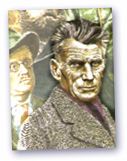 Samuel Beckett (1906-1989) was born in nearby Foxrock, but he is remembered in Dun Laoghaire in a plaque on the East Pier.
Samuel Beckett (1906-1989) was born in nearby Foxrock, but he is remembered in Dun Laoghaire in a plaque on the East Pier.
The plaque is just below the weather station and anenometer. (See map right)
 Beckett was born in Foxrock, Dublin. He would later insist that he was born on Good Friday,13 April 1906, although his birth certficate puts the date a month later. The Becketts were of French Huguenot descent and, after a distinguished career at Trinity College, Dublin, he was to spend much of his life in France. His cricketing prowess earned him a mention in Wisden (the only Nobel Prize winner there), while he topped his year in modern languages. In 1928, he was appointed to an exchange lectureship in Paris, where he met and helped James Joyce before returning to TCD in 1930.
Beckett was born in Foxrock, Dublin. He would later insist that he was born on Good Friday,13 April 1906, although his birth certficate puts the date a month later. The Becketts were of French Huguenot descent and, after a distinguished career at Trinity College, Dublin, he was to spend much of his life in France. His cricketing prowess earned him a mention in Wisden (the only Nobel Prize winner there), while he topped his year in modern languages. In 1928, he was appointed to an exchange lectureship in Paris, where he met and helped James Joyce before returning to TCD in 1930.
A critical study of Marcel Proust (1931) pointed to an academic career, but Beckett chose to become a full-time writer. He travelled widely, living rather precariously, before settling in Montparnasse in Paris in 1937. His comic novel Murphy was published in 1938. He also met Suzanne Dumesnil, when she helped him to hospital after a street stabbing; they were to marry in 1961. Beckett was in Dublin at the outbreak of World War II, but 'preferred France at war to Ireland at peace'. He worked for the French Resistance, narrowly escaped the Gestapo, then moved to unoccupied France, where he wrote his novel Watt.
In 1947, he returned to Paris, where within two years he wrote his trilogy of novels. Molloy, Malone Dies and The Unnameable, and the play Waiting for Godot. By now, he was writing in French, then translating into English. Godot had its first production in 1953, and its success made the reclusive Beckett an international figure. In this innovative tragi-comedy, the tramps Vladimir and Estragon await someone they have never met and who may not exist. 'If I knew who Godot was,' said Beckett, 'I would have said so in the play'.
Other bleakly comic plays followed. 'Nothing is funnier than unhappiness, ' says Nell in Endgame, speaking from a dustbin. In Happy Days, the heroine is buried in sand. Beckett was awarded the Nobel Prize for Literature in 1969, but shunned the presentation ceremony. He died in Paris on 22 December 1989.
From the Appletree Press title: Famous Irish Lives.


